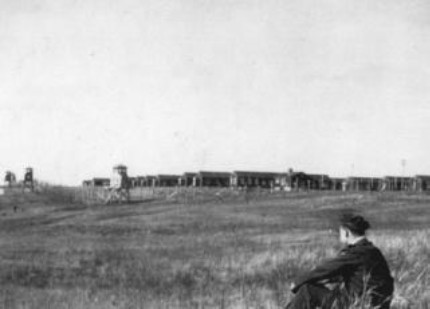
|
|
August 2010
Here is part 4 in our series of recollections by Canadian Lt. Leo L. Hamson, regarding his time as a guard at the Wainwright POW camp. (minor typos corrected) (Update: The full set of Recollections is back online, with photos.) Dreary Prospects For a POWHowever, any harsh conditions and rigid regulations had softened greatly by the time I arrived at Wainwright. The war had ended several months before, and attitudes had changed considerably. Germany had lost the long and bloody war, and our unwilling guests were no longer considered a dangerous threat to our security. At that point in time, the only possible motive for escape was to become illegal immigrants to Canada, with the hope of melting undetected into our population. All thoughts, for captives and captors alike, were on salvaging all they could from ruined lives. For us, the victors, there were bright hopes in a country that despite the great cost of our victory, was spared the physical blight of war. For the vanquished, there was despair and uncertainty, knowing that their homeland was now largely in smoking ruins. It must have been a terrible thing to have suffered so much on far-flung battlefields and to know that it was all for nothing. They too were victims of the greatest episode of mass insanity in human history. It was not generally realized that officially these men were prisoners of the British, and they were being incarcerated in Canada at the request of the British Government for obvious reasons. In Britain they were short of food and space, and any escapers posed more of a threat to security in what was literally a war zone. Britain retained control, and their wishes had to be complied with. I was not aware at the time of an extraordinarily harsh and pointless order concerning the treatment of POWs that came from Britain after the war ended. I learned of this only recently from the reminiscences of former Wainwright POW Siegfried Osterwoldt. Rations were reduced to 900 calories per day, barely above subsistence level. The reasoning behind this is obscure. Was it to punish the Germans for the starvation and deprivation among war victims across Europe? To let them know what real hunger felt like after living so well on Canadian rations that they had difficulty buttoning their uniforms? I have no idea of what the Canadian authorities thought of this order from the British Government, but under the bilateral agreement the Canadians had no option but to comply. I learned recently that the American government at the same time imposed the same ration restrictions on the thousands of POWs they held in the U.S.A. One thing was certain - with the defeat of Germany and the liberation of our men from their POW camps, there was no danger of retaliation. Copyright 2004 by Leo Hamson; used with permission The rations were apparently reduced to the level that prevailed in Germany at the time (due to the extreme food shortages after the war). That was also about what Allied POWs were receiving in German camps towards the end of the war. From his personal contacts with former German POWs (who were generally quite appreciative of their good treatment in Canada), David J. Carter adds:
|

